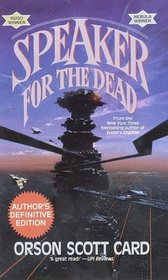Helpful Score: 6
Once you've read "Ender's Game" you must go on. There are two paths to take. One is "Ender's Shadow" (which my daughter read next), and the other is "Speaker for the Dead"(which I read next). It's such a thought provoking world to get into. All the books in the series aren't equally good, but they're good enough to be worth the time to get the whole story.
"Ender's Game" was a must read in my opinion."Speaker" is a world of people and feelings that has stayed with me eventhough I read it 5 years ago.A great series.
"Ender's Game" was a must read in my opinion."Speaker" is a world of people and feelings that has stayed with me eventhough I read it 5 years ago.A great series.
Helpful Score: 4
After reading Ender's Game, this next book was a must. It can, however, stand on it's own quite well. You get enough of the previous story to understand the book, and it's very engrossing. It's nothing like the first book, which I find refreshing.
The author actually wrote Ender's Game (the novelization, not the short story) with this next book in mind, and it shows. As good as Ender's Game is (and it is VERY good, so if at all possible, start with THAT one), you can easily see the care Card put into the concept of Speaker for the Dead.
The author actually wrote Ender's Game (the novelization, not the short story) with this next book in mind, and it shows. As good as Ender's Game is (and it is VERY good, so if at all possible, start with THAT one), you can easily see the care Card put into the concept of Speaker for the Dead.
Helpful Score: 2
Orson Scott Card is a masterful writer, and this is an engaging story. It's a far more adult story than Ender's Game, and it's got a lot more philosophy than action. But there are tons of fantastic ideas, and the core mystery pulls you along to the end.
Helpful Score: 1
I have read hundreds of science fiction novels over the years, and this is the best written one I've ever had the pleasure of. Solid science and dynamic characters you can relate to. How often does a sci-fi novel actually make you cry? I've enjoyed all the books in the Ender Wiggins saga, and this one is my favorite.
Helpful Score: 1
Stylistically, this book was nearly a 180 from "Ender's Game", and is the better for it. There is much greater depth of character and story here...which is not surprising when you learn that EG was originally a short story, and was only fleshed out into a full novel when Card wanted to use Ender's character in "Speaker".
"Speaker for the Dead" echoed the best of Octavia Butler and Ursula K. LeGuin with its complex interactions between cultures and unstinting anthropological detail on an invented alien race. It surprises me now to learn how radically different Card's personal views are, and how he seems unable to treat the real world with the same sense of nuance and interconnected spirituality that he creates in this fictional colony. I originally thought the idea of a Speaking would be a wonderful funeral service for those of us who don't believe in an afterlife...but with the legacy of a homophobic religious fundamentalist as its creator, the notion loses its appeal.
Scientifically, this novel had the truest-to-known-physics explanation of near-light-speed travel I've ever encountered in science fiction. Voyages take thousands of years in real time, but the travelers themselves experience this as much less time. Ender, who has done quite a bit of traveling, is in his mid-30's physically, but the events of "Speaker" take place three thousand years after the conclusion of "Ender's Game".
"Speaker for the Dead" echoed the best of Octavia Butler and Ursula K. LeGuin with its complex interactions between cultures and unstinting anthropological detail on an invented alien race. It surprises me now to learn how radically different Card's personal views are, and how he seems unable to treat the real world with the same sense of nuance and interconnected spirituality that he creates in this fictional colony. I originally thought the idea of a Speaking would be a wonderful funeral service for those of us who don't believe in an afterlife...but with the legacy of a homophobic religious fundamentalist as its creator, the notion loses its appeal.
Scientifically, this novel had the truest-to-known-physics explanation of near-light-speed travel I've ever encountered in science fiction. Voyages take thousands of years in real time, but the travelers themselves experience this as much less time. Ender, who has done quite a bit of traveling, is in his mid-30's physically, but the events of "Speaker" take place three thousand years after the conclusion of "Ender's Game".




